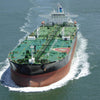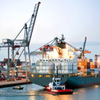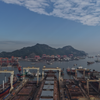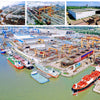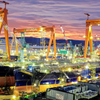Top 10 shipowner countries/regions in the world
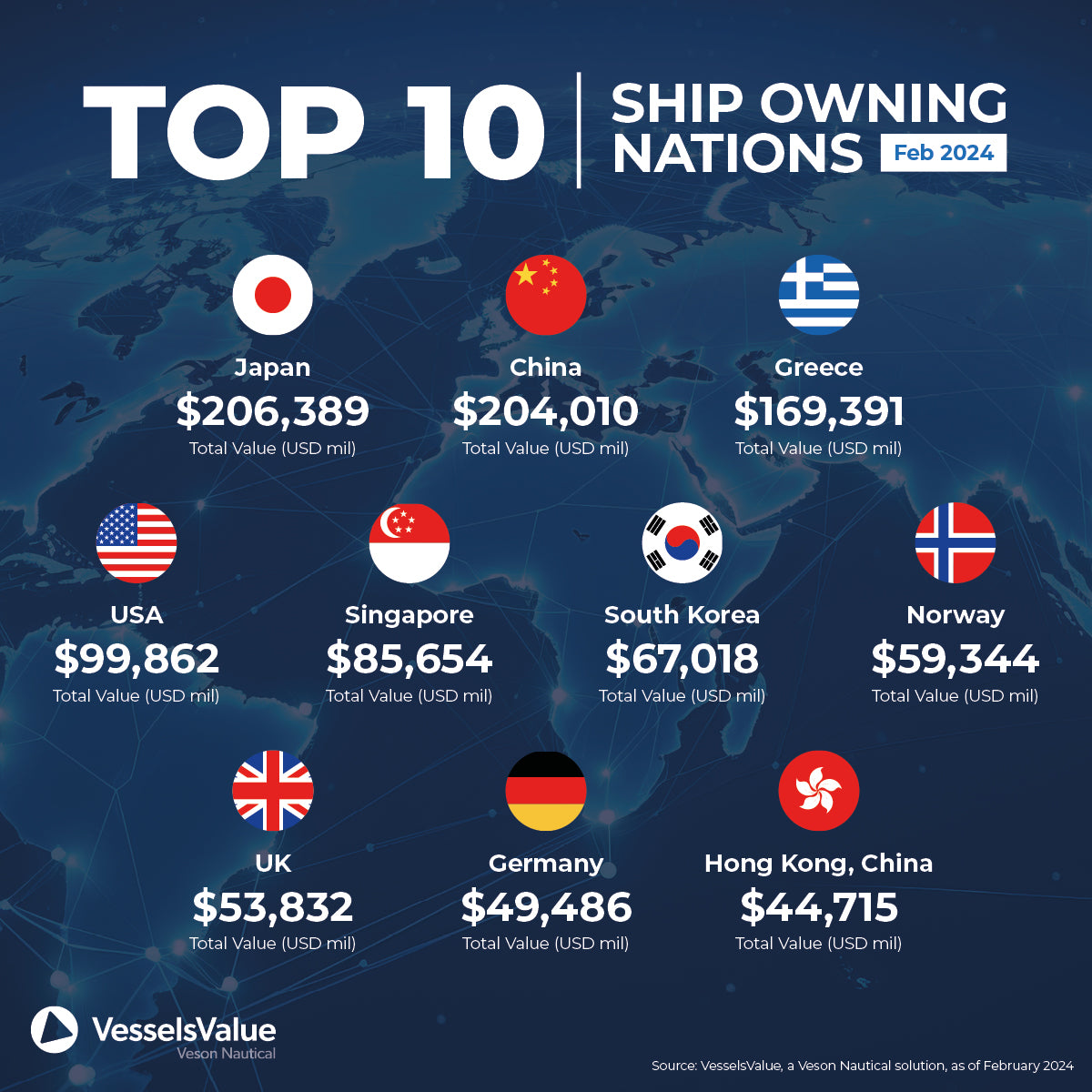
The 2024 list of the top 10 shipowner countries/regions in the world by total assets value of ships in the country where the beneficiary shipowner is located has been released.
The report shows that there have been major changes in global shipowner assets value and shipowner strategies over the past 12 months, with Japan taking the top spot with a total fleet value of $206.3 billion, and Hong Kong, China entering the top 10 for the first time with a total fleet value of $44.7 billion.
No1:Japan
Japan has the largest fleet with a total asset of about $206.3 billion. Since November 2022, the total asset value of the fleet as a whole has increased by about 5%. Japan's tanker assets have attracted a large amount of investment, increasing by nearly 100 vessels in number and by about 15.5% in total value.
Over the past year, the asset value of almost all sub-types and age categories in this field has continued to grow. For example, the value of a 160,000-dwt, 10-year-old Suez-type tanker has increased from $53.43 million to $64.01 million, an increase of about 19.8%.
Among the top 10 shipowners, Japan has the highest value of LNG and LPG fleet with a value of $37.8 billion and $13.4 billion, respectively, with 202 and 344 vessels respectively. Japan also has the world's largest and most valuable motor transport vessel fleet with 334 vessels and a total value of $22.9 billion.
No2: China
China, which ranks second, continues to dominate the list, with 6,084 vessels and a fleet value of $204 billion. There is no doubt that China continues to lead the world in terms of fleet size and total asset value in the bulk carrier sector. Thanks to improved market fundamentals, yields on bulk carriers, particularly Capesize vessels, have been strong, which has in turn boosted asset values. For example, the value of a newly built 180,000 deadweight tons, zero-year-old vessel has increased from $54.75 million to $71.37 million, up about 30.36% year-on-year and at its highest level since March 2010.
Globally, China also has the largest number of tankers and container ships. The tanker fleet consists of 1,576 vessels with a total value of $47.4 billion; the container fleet has 1,011 vessels with a total value of $42.6 billion.
China's container fleet continues to expand, but its total value has declined by about 23.8%. Meanwhile, the market has fallen sharply from its high point in 2022, which has affected the value of vessels in many ship categories. For example, the value of a 1750-TEU, 20-year-old handy container ship has fallen from $8.55 million to $6.76 million, down about 20.1% year-on-year.
No3: Greece
Greece ranks third in the total number and value of ships owned. The value of Greece's tanker assets is the highest in the world.
The surge in demand for international transport due to the Russia-Ukraine war and the recent situation in the Red Sea has greatly boosted tanker earnings, and the situation will not change much in the short term.
Many types of tanker assets are currently hovering in value. The highest level since 2010, such as 160,000 deadweight tons, the value of 15-year old Suise tankers from $38.37 million increased to the current $46.28 million, an increase of approximately 20.62% over the same period last year.
Greece is also the owner of the world's second largest LNG fleet, with 143 vessels and a fleet value of $31.1 billion. The value of the ship's assets has remained at a high level since 2022.
No4: USA
The United States ranks fourth, with assets worth $99 billion. Total assets have increased by more than $1 billion since the last ranking.
The United States is the world's largest owner of cruise ships, with assets valued at $49 billion. As we all know, Carnival and Royal Caribbean, the two leading cruise lines, are headquartered in the United States.
The tanker fleet owned by the United States since the last report. The value decreased by $4.7 billion overall, but it still maintained its position as the leader in the field.
The United States is also a major owner of RO-RO ships, with the world's largest ro-ro ship fleet - worth about $2.5 billion. However, in terms of numbers, the United States has only 40 RO-RO ships, far behind Japan, which has 84 ships of this type.
No5: Singapore
Singapore again ranked fifth this year, with a fleet value of about $85.7 billion, it ranks fourth in the world by volume. Singapore has a container fleet worth $22.1 billion, accounting for almost a quarter of the total value of the global fleet, ranking third.
Benefiting from the improved market for LPG vessels and firmer ship asset values, Singapore's second-hand vessel trading in this sector continues to be active.
The country now has a fleet of LPG vessels valued at $9.3 billion, a significant increase of 57% compared to the last list. This strong growth has propelled Singapore to the position of the world's second largest shipowner in terms of total value of liquefied petroleum gas vessels.
No6: Korean
South Korea remains in sixth place, with its fleet now valued at $67 billion, an increase of more than $1 billion since the last report.
South Korea has dropped out of the top 10 in terms of the number of ship assets it owns, overtaken by newcomers such as the United Arab Emirates, Russia and the Netherlands.
South Korea's investments in the LNG tanker sector continue to pay off, with the value of vessels in this sector remaining stable and at a high level.
South Korea has maintained its core position as a global auto exporter, investing continuously in new shipbuilding.
No7: Norway
Norway moves up to seventh place with a total fleet value of $59.3 billion.
This was mainly driven by investments received in the gas tanker sector, with the Norwegian LNG tanker fleet since the last report. The value increased from $12.2 billion to $14.2 billion, an increase of about 16.7 percent.
The value of Norway's LPG fleet increased by about 55% from $2.9 billion to $4.5 billion on the back of second-hand vessel transactions and active new shipbuilding orders.
Norway in its global new shipbuilding order book in 2023. The addition of 10 LPG vessels, including an overall deal for Norwegian ship owner Solvgang ASA to order five 88,000 cubic meter very large LPG vessels from Korea's Hyundai Heavy Industries, with a single vessel value ranging from $107.1 million to $106.5 million, scheduled for delivery in 2026-2027.
Norway is also the world's second largest motor transport shipowner. The current value of the fleet is $9.2 billion, an increase of about 13%.
No8: United Kingdom
United Kingdom currently ranks eighth in the global ship ownership standings, with a total fleet value of $53.8 billion. The cruise sector is the most significant component of the UK's fleet, accounting for approximately 25% of the total value. Despite a decline in the market share of the container transport sector, growth in the tanker sector has compensated for this drop, indicating a partial market recovery. Additionally, there has been a significant increase in investment in the Liquefied Petroleum Gas (LPG) sector, with fleet value rising from $2.9 billion to $5 billion, an increase of about 30%.
No9: Germany
Germany has dropped to ninth in the global ship ownership rankings, with its fleet value decreasing from the previous report's $32.1 billion to $17.8 billion, a reduction of approximately 45%. This is primarily due to a market adjustment in container ships as the market corrected from the peak of the early 2020s, resulting in decreased earnings and vessel values. Despite the challenges, Germany has increased its investment in the Liquefied Natural Gas (LNG) fleet, with the fleet value increasing by $625 million to $1 billion.
No10: Hong Kong, China
Hong Kong, a newcomer to the list, ranks tenth with a total fleet value of $44.7 billion. Significant investment in the bulker sector alone contributes 29% to the total fleet value, approximately $13 billion. The bulker sector in Hong Kong has benefited from strong market performance, particularly modern vessels, such as 5-year-old Capesize ships, which have seen a yearly increase in value of 32.14%.





